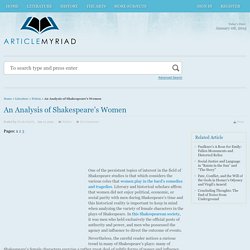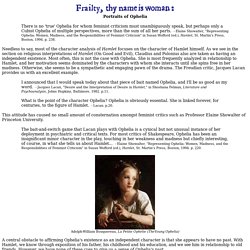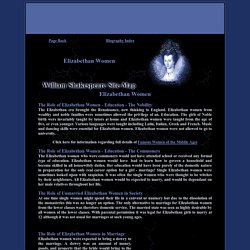

An Analysis of Shakespeare’s Women. One of the persistent topics of interest in the field of Shakespeare studies is that which considers the various roles that women play in the bard’s comedies and tragedies.

Literary and historical scholars affirm that women did not enjoy political, economic, or social parity with men during Shakespeare’s time and this historical reality is important to keep in mind when analyzing the variety of female characters in the plays of Shakespeare. In this Shakespearean society, it was men who held exclusively the official posts of authority and power, and men who possessed the agency and influence to direct the outcome of events.
Nevertheless, the careful reader notices a curious trend in many of Shakespeare’s plays: many of Shakespeare’s female characters exercise a rather great deal of subtle forms of power and influence, and often do so in unusual and even subversive ways that challenge traditional gender roles. The Myriad: Westminster's Undergraduate Academic Journal. In A Room of One's Own, Virginia Woolf addresses the topic "Women and Fiction," offering her own reading of history from a woman's perspective by emphasizing women's lack of tradition in a historically male-dominated society.

Woolf's essay sets up a juxtaposition between males and females which is particularly helpful in framing the reader's understanding of relationships in literature prior to Woolf's time. Woolf's modern reading of history allows the reader to interpret Shakespeare's Ophelia not as a source of admiration for her assertion of identity but, rather, as a source of sympathy for her loss of identity after the removal of male dominance. Through her essay, Woolf attempts to account for the effect of the past upon female writers as well as female fictional characters, concluding that the woman's position in history-- seen only in relation to men--is problematic because of the hierarchy implicit in the relationship.
Works Cited Dane, Gabrielle. Neely, Carol Thomas. Hamlet: Plot Overview. A ghost resembling the recently deceased King of Denmark stalks the ramparts of Elsinore, the royal castle.

Terrified guardsmen convince a skeptical nobleman, Horatio, to watch with them. When he sees the ghost, he decides they should tell Hamlet, the dead King's son. Hamlet is also the nephew of the present King, Claudius, who not only assumed his dead brother's crown but also married his widow, Gertrude. Claudius seems an able King, easily handling the threat of the Norwegian Prince Fortinbras. But Hamlet is furious about Gertrude's marriage to Claudius. Yet Hamlet is uncertain if what the ghost said is true. Polonius and Claudius spy on the meeting between Ophelia and Hamlet, during which Hamlet flies into a rage against women and marriage. Claiming that he wants to protect Hamlet from punishment for killing Polonius, Claudius sends Hamlet to England with Rosencrantz and Guildenstern. Meanwhile, grief drives Ophelia insane, and she drowns in what seems to be a suicide. Viewcontent. Hamlet Navigator: Hamlet: His Thoughts about Women. Viewcontent. 04_Prime_University.
Women In Hamlet. I pictured Ophelia to myself as the motherless child of an elderly Polonius.

His young wife had first given him a son, Laertes, and had died a few years later, after giving birth to the poor little Ophelia. The son takes much after his father, and, his student-life over, seeks his pleasures in the gayer life of France; fond of his little sister in a patronizing way, in their rare meetings, but neither understanding nor caring to understand her nature. The baby Ophelia was left, as I fancy, to the kindly but thoroughly unsympathetic tending of country-folk, who knew little of "inland nurture. " Think of her, - sweet, fond, sensitive, tender-hearted, the offspring of a delicate dead mother tended only by roughly-mannered and uncultured natures! When we first see her, we may fairly suppose that she has been only a few months at court. Elizabethan Women. Elizabethan Women The Role of Elizabethan Women - Education - The NobilityThe Elizabethan era brought the Renaissance, new thinking to England.

Elizabethan women from wealthy and noble families were sometimes allowed the privilege of an. Education. The girls of Noble birth were invariably taught by tutors at home and Elizabethan women were taught from the age of five, or even younger. Various languages were taught including Latin, Italian, Greek and French. Viewcontent.cgi?article=1178&context=comssp&sei-redir=1&referer=http%3A%2F%2Fscholar.google.